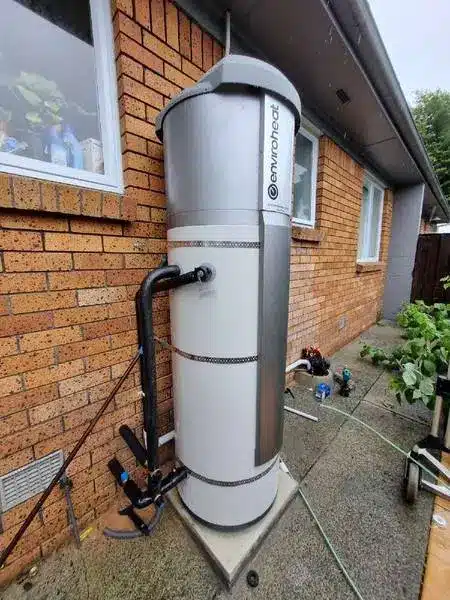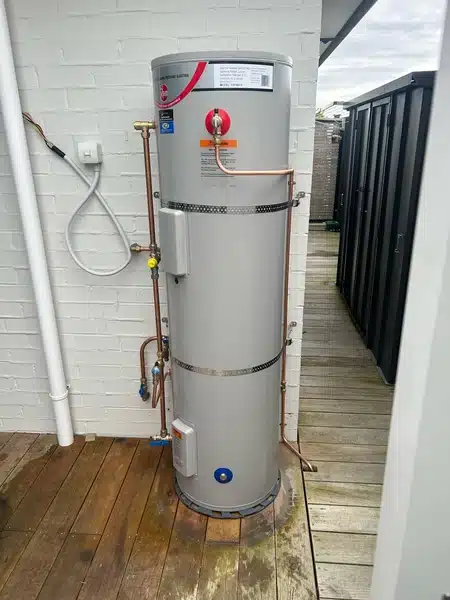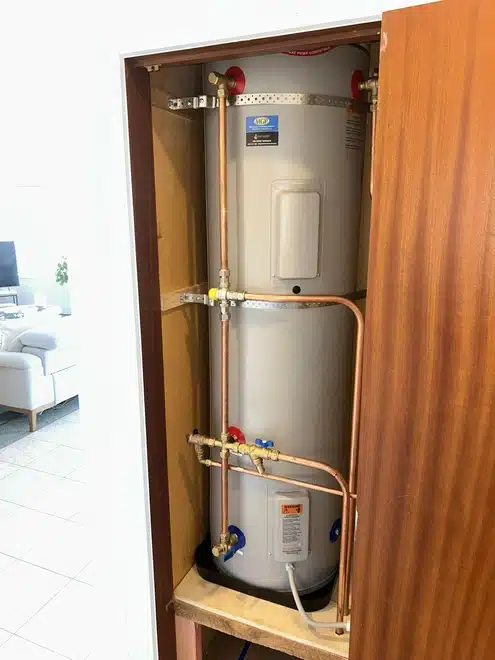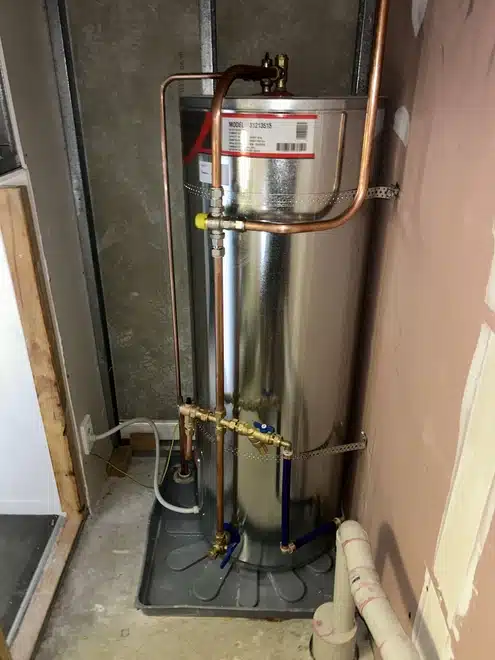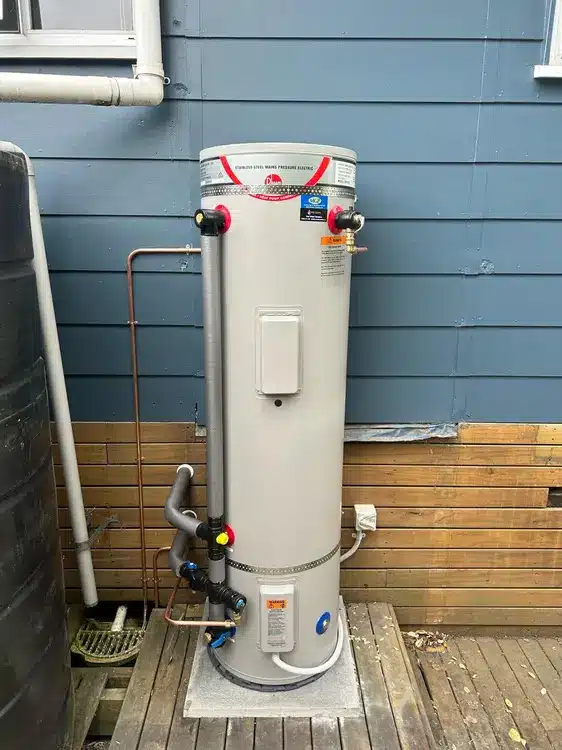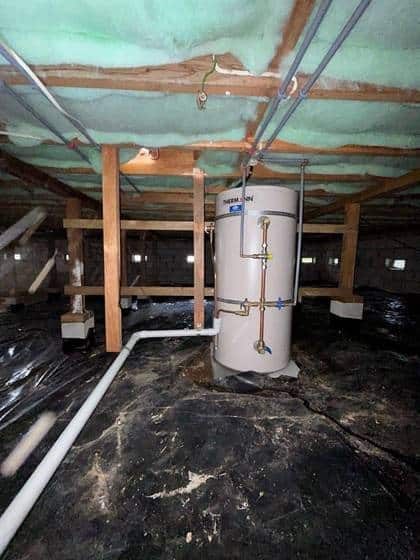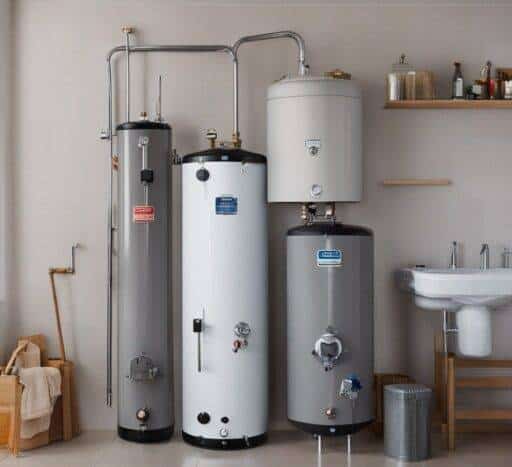How Do Heat Pump Water Heaters Work?
Heat pump water heaters work a bit differently than traditional electric or gas storage tanks. Rather than directly heating the water using an element or burner, they operate like a refrigerator in reverse – moving ambient heat from the surrounding air into the water tank. This makes them much more energy efficient.
Inside the heat pump water heater is a compact refrigeration system with a compressor, evaporator coil and condenser coil. The evaporator coil extracts available heat from the surrounding air, even when air temperatures are as low as 5°C. This heat is intensified by the compressor and transferred via the condenser coil into the insulated water tank.
Built-in thermostats control the cycling on and off to maintain a constant tank temperature. Modern units also have useful energy-saving features like timers and different operating modes.
Benefits of Heat Pump Water Heaters
There are several great reasons to consider installing a heat pump water heater in your home:
Save substantially on hot water heating costs. Heat pumps can use around 60% less power than conventional electric water heating.
Lower carbon footprint. Greater energy efficiency equals fewer CO2 emissions.
Get government subsidies and rebates. Qualifying heat pump water heater installations can receive funding assistance.
Enjoy endless hot water. The technology enables unlimited showers and baths.
Compact, quiet designs. Models are available for easy replacement of existing tanks.
Factors to Consider When Choosing a Unit
With so many brands and system variations available, it helps to weigh up a few key factors when selecting a heat pump water heater:
Storage Tank Size
The tank size you need depends on your household requirements. Look at your existing system’s tank volume or opt for larger 180L to 250L tanks to accommodate high demand.
Location
Outdoor models will likely offer the lowest operating costs. However, indoor units can still provide substantial savings.
Climate and Conditions
Consider ambient temperatures, potential shade/sun exposure and ventilation needs when positioning your heat pump unit.
Noise Levels
System noise varies. Compare sound ratings if the unit will be installed close to living areas. Ultra-quiet inverter models are also available.
Energy Efficiency Ratings
Higher COP (Coefficient of Performance) equates to greater energy efficiency and lower running costs. Look for a COP of 3.0 or greater.
Installation Costs
Upfront costs are important. Weigh these against the long-term savings on bills when investing in a new system.
Warranties
Products with longer warranties often indicate better reliability and durability. Opt for at least 5 years coverage.
Rebates and Incentives
Don’t forget regional council subsidies of up to $700 and EnergyMate government grants of up to $1300 to help offset purchase and installation costs.
How Much Could You Save Annually?
The potential savings achievable by upgrading to a heat pump water heater really add up over time. An appropriately sized unit could conservatively save a 3–4-person household $350 or more off their annual water heating bill.
Over a 10-year period, you could save $3,500 compared to using an electric storage tank. This offsets a large portion of the initial investment in a new heat pump hot water system.
Tips For Maximising Efficiency
Installing a heat pump water heater is the first step. But a few key usage tips will help you unlock the full money-saving potential:
Position Wisely
Carefully consider where to best locate new outdoor units using the installation guidelines. Optimal placement enables peak performance.
Set Optimal Temperatures
Heat pump efficiency can diminish substantially at higher water temperatures. Set your tank thermostat between 55°C-60°C to save power.
Use Timer Options
Make the most of built-in operating timers that allow heating only during set periods, lowering off-peak energy consumption.
Enable ECO/Economy Modes
Special modes minimise power use during high-demand periods by temporarily suspending heating, while maintaining temperature.
Isolate From Cold Drafts
Avoid exposing outdoor units to cold winds which force the system to work harder to extract ambient heat.
Maintain Properly
Replace filters as needed so adequate air circulation continues around key components.
Reduce Water Demand
Installing water-saving shower heads and taps cuts the amount of heating required for less strain on the system.
Savings Add Up Over Time
The more disciplined you are using the suggestions above, the greater your seasonal savings will grow. Small daily optimisations make a big annual difference!
What If You Go Solar?
Combining rooftop solar with a heat pump water heater takes energy bill savings to the next level. Here’s what to expect if you go renewable:
Dramatically Lower Bills
Slash water heating costs by over 80% compared to electric storage tanks, for almost free hot water!
Increase Solar System ROI
Solar panels heat your water heater for less. Receive higher returns on your PV investment.
Lower Environmental Impact
Go 100% renewable for water heating needs – reducing household carbon emissions significantly.
Save During Outages
Well-sized solar systems keep hot water flow uninterrupted during grid blackouts.
Earn Revenue Selling Excess
For grid-tied systems, export surplus solar power generation back to utility companies.
Charge Electric Vehicles
Use the remaining solar energy during the day to top up your electric car – then cut petrol costs.
Prepare For the Future
Combining solar power and efficient heat pumps future-proofs your home for higher electricity prices.
Experience Energy Freedom
Break free from reliance on traditional grid suppliers and keep more hard-earned money in your pocket.
Financial Incentives
Available Homeowners can receive both solar panel and heat pump rebates from NZ government bodies.
The technology exists right now to take control of your skyrocketing energy expenses. Transition to renewable solar power and heat pumps for a comfortable, affordable, and environmentally friendly future. You’ll enjoy greater energy independence and rapidly recoup system costs through the power bill savings. Contact installers today to discuss your solar and hot water heating options!
Getting Started
If rising water heating bills are impacting your budget, now could be the ideal time to go heat pump. Carefully compare the options to find an efficient, cost-effective model suited to your home and usage needs.
Take advantage of available subsidies, then enjoy lower energy bills and an unlimited supply of hot water for years to come!
Use our contact us page to reach us and we will be more than happy to discuss your hot water situation. Or give us a call on 0800 497658.
At Hot Water Solutions all we do is hot water!

